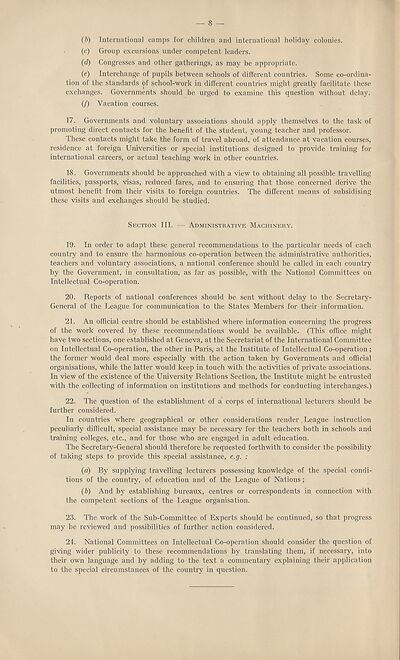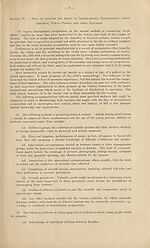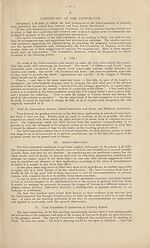Download files
Complete book:
Individual page:
Thumbnail gallery: Grid view | List view

— 8 —
(b) International camps for children and international holiday colonies.
(c) Group excursions under competent leaders.
(d) Congresses and other gatherings, as may be appropriate.
(e) Interchange of pupils between schools of different countries. Some co-ordina¬
tion of the standards of school-work in different countries might greatly facilitate these
exchanges. Governments should be urged to examine this question without delay.
(/) Vacation courses.
17. Governments and voluntary associations should apply themselves to the task of
promoting direct contacts for the benefit of the student, young teacher and professor.
These contacts might take the form of travel abroad, of attendance at vacation courses,
residence at foreign Universities or special institutions designed to provide training for
international careers, or actual teaching work in other countries.
18. Governments should be approached with a view to obtaining all possible travelling
facilities, passports, visas, reduced fares, and to ensuring that those concerned derive the
utmost benefit from their visits to foreign countries. The different means of subsidising
these visits and exchanges should be studied.
Section III. — Administrative Machinery.
19. In order to adapt these general recommendations to the particular needs of each
country and to ensure the harmonious co-operation between the administrative authorities,
teachers and voluntary associations, a national conference should be called in each country
by the Government, in consultation, as far as possible, with the National Committees on
Intellectual Co-operation.
20. Reports of national conferences should be sent without delay to the Secretary-
General of the League for communication to the States Members for their information.
21. An official centre should be established where information concerning the progress
of the work covered by these recommendations would be available. (This office might
have two sections, one established at Geneva, at the Secretariat of the International Committee
on Intellectual Co-operation, the other in Paris, at the Institute of Intellectual Co-operation;
the former would deal more especially with the action taken by Governments and official
organisations, while the latter would keep in touch with the activities of private associations.
In view of the existence of the University Relations Section, the Institute might be entrusted
with the collecting of information on institutions and methods for conducting interchanges.)
22. The question of the establishment of a corps of international lecturers should be
further considered.
In countries where geographical or other considerations render League instruction
peculiarly difficult, special assistance may be necessary for the teachers both in schools and
training colleges, etc., and for those who are engaged in adult education.
The Secretary-General should therefore be requested forthwith to consider the possibility
of taking steps to provide this special assistance, e.g. :
(a) By supplying travelling lecturers possessing knowledge of the special condi¬
tions of the country, of education and of the League of Nations;
(b) And by establishing bureaux, centres or correspondents in connection with
the competent sections of the League organisation.
23. The work of the Sub-Committee of Experts should be continued, so that progress
may be reviewed and possibilities of further action considered.
24. National Committees on Intellectual Co-operation should consider the question of
giving wider publicity to these recommendations by translating them, if necessary, into
their own language and by adding to the text a commentary explaining their application
to the special circumstances of the country in question.
(b) International camps for children and international holiday colonies.
(c) Group excursions under competent leaders.
(d) Congresses and other gatherings, as may be appropriate.
(e) Interchange of pupils between schools of different countries. Some co-ordina¬
tion of the standards of school-work in different countries might greatly facilitate these
exchanges. Governments should be urged to examine this question without delay.
(/) Vacation courses.
17. Governments and voluntary associations should apply themselves to the task of
promoting direct contacts for the benefit of the student, young teacher and professor.
These contacts might take the form of travel abroad, of attendance at vacation courses,
residence at foreign Universities or special institutions designed to provide training for
international careers, or actual teaching work in other countries.
18. Governments should be approached with a view to obtaining all possible travelling
facilities, passports, visas, reduced fares, and to ensuring that those concerned derive the
utmost benefit from their visits to foreign countries. The different means of subsidising
these visits and exchanges should be studied.
Section III. — Administrative Machinery.
19. In order to adapt these general recommendations to the particular needs of each
country and to ensure the harmonious co-operation between the administrative authorities,
teachers and voluntary associations, a national conference should be called in each country
by the Government, in consultation, as far as possible, with the National Committees on
Intellectual Co-operation.
20. Reports of national conferences should be sent without delay to the Secretary-
General of the League for communication to the States Members for their information.
21. An official centre should be established where information concerning the progress
of the work covered by these recommendations would be available. (This office might
have two sections, one established at Geneva, at the Secretariat of the International Committee
on Intellectual Co-operation, the other in Paris, at the Institute of Intellectual Co-operation;
the former would deal more especially with the action taken by Governments and official
organisations, while the latter would keep in touch with the activities of private associations.
In view of the existence of the University Relations Section, the Institute might be entrusted
with the collecting of information on institutions and methods for conducting interchanges.)
22. The question of the establishment of a corps of international lecturers should be
further considered.
In countries where geographical or other considerations render League instruction
peculiarly difficult, special assistance may be necessary for the teachers both in schools and
training colleges, etc., and for those who are engaged in adult education.
The Secretary-General should therefore be requested forthwith to consider the possibility
of taking steps to provide this special assistance, e.g. :
(a) By supplying travelling lecturers possessing knowledge of the special condi¬
tions of the country, of education and of the League of Nations;
(b) And by establishing bureaux, centres or correspondents in connection with
the competent sections of the League organisation.
23. The work of the Sub-Committee of Experts should be continued, so that progress
may be reviewed and possibilities of further action considered.
24. National Committees on Intellectual Co-operation should consider the question of
giving wider publicity to these recommendations by translating them, if necessary, into
their own language and by adding to the text a commentary explaining their application
to the special circumstances of the country in question.
Set display mode to:
![]() Universal Viewer |
Universal Viewer | ![]() Mirador |
Large image | Transcription
Mirador |
Large image | Transcription
Images and transcriptions on this page, including medium image downloads, may be used under the Creative Commons Attribution 4.0 International Licence unless otherwise stated. ![]()
| League of Nations > International > International committee on intellectual co-operation > (8) |
|---|
| Permanent URL | https://digital.nls.uk/195219359 |
|---|
| Shelfmark | LN.XII |
|---|
| Description | Over 1,200 documents from the non-political organs of the League of Nations that dealt with health, disarmament, economic and financial matters for the duration of the League (1919-1945). Also online are statistical bulletins, essential facts, and an overview of the League by the first Secretary General, Sir Eric Drummond. These items are part of the Official Publications collection at the National Library of Scotland. |
|---|---|
| Additional NLS resources: |
|

